This is a touching tale about a little storage shed in a southern town. For a brief time, it was a beacon of hope for… me.
Story #11: Dad’s Shed
Let me tell you a story…
Many times, I drove nearly 700 miles to the southern part of the country to visit my mom and dad. Before that, they lived in a large urban city for four decades, working and raising a family. One day, long after I left home, my mother called with news that they were moving south. Both were born there, as were my brother and I. My other siblings were born up north.
How did they wind up living in the cold of the north? Well that is a story not much different from many men and women who left the inhospitable south to seek better opportunities in the north. Many of them tried to create a life that helped them forget their experiences in their early years.
Some of them struggled to do that. All of them experienced a reality they did not expect. The north – that perceived land of opportunity – was full of horrors that were in many ways worse than the south. They experienced housing, job, and medical discrimination, underemployment, wage theft, sexual harassment and assault, police brutality and scapegoating for white flight. In those and other words, the realization dawned that segregation existed here, too.
It and its attendant activities were in many ways far worse than in the south.
The meaning
A tool that effectively stifled the economic and political growth in the neighborhoods where black people lived was redlining and gerrymandering which served as a counter-balance to civil rights “gained” during the sixties. People tried to escape the confinement of housing projects and food deserts, displacement by interstate highway projects, store closings, lack of development and other deliberate activities that decimated our communities. Instead, they were gas lighted on every turn.
Neighborhoods were and continue to be eliminated, leaving former inhabitants – still citizens – with nowhere to go. Many people were trapped in the neighborhoods where a waiting game was being played out. The game players stood to gain back the territory.
Worthless vouchers for alternative housing were issued for those wanting to move, but they were not willingly accepted in other parts of the metropolitan area. Transportation costs to jobs miles away from home prevented savings much less anything for emergencies. People continue to fight for survival…
There is more of the story to tell, but I will stop here for now.
Getting back to my mom’s call.
Whose shed is it anyway?
They were moving back south because they felt that their late retirement years would be less stressful. After all, family and childhood friends were also there. Many had retired south or never left.
Soon after the move, family members left this living earth. Accidents and the scourge of sickle cell impacted many members of the family. People wasted away from inadequate and non-existent healthcare. My grandmother died. A close friend of my mother’s also died. Both deaths touched my mother deeply.
Family reunions grew smaller until there were none. Relatives got sicker including my mom and dad. I visited as often as I could bearing gifts of attention, time, money, labor and my love.
The shed…
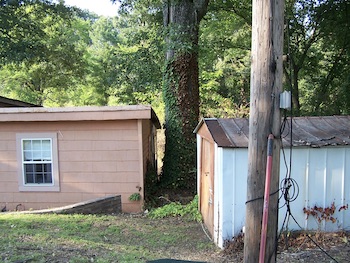
Simple wants
My father tickled me so much with his childhood wishes. He wanted to one day have a pickup truck, a riding lawn mower, and a place to sit outside and breathe the good old air. And you know what? His wishes came true after a lot of sacrifices he made for his family. They all happened late in his life, but he was able to enjoy them at least for a little while.
Now all he wanted to do was…. nothing. No more hard work for him. On many occasions, to my mother’s chagrin, he would not do more work than was necessary around the house. I know it was due to the hard times and rough treatment he experienced in the work he did in the north and the south.
He reluctantly agreed to come back down south because my mother longed to return to the solace of their families. My mother found an old house that was not so far out in the country. Initially he seemed happy going to town for a little ice cream, enjoying family visits, and riding his lawn mower.
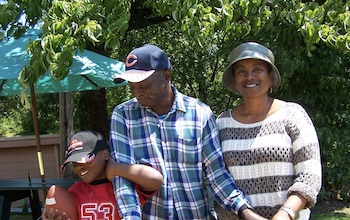
One day my mother called. She was worried that my dad was lost in his car. A twenty minute chore stretched into a few hours. Fortunately, people from town knew him and helped him get back home. My mother would call again to warn me about his condition. It was happening more and more. I began to worry too and made many trips to support them both.
Big daughter
I brought my tools along to make repairs and do anything my mother needed. My father was always excited to see me. He would sit at the picnic table in the yard and wait for me to pull into the driveway. It touched my heart because he was not demonstrative when I was growing up. He was busy working a job, sometimes two, to feed us and keep a roof over our heads.
Now he would “help” while I worked. His encouragement and presence were enough for me. Often, when it was time for me to leave he would stay in bed. I had to go to his room to say good-bye. One day my mother told me that he cried many times when I left. It broke my heart.
My dad, who prided himself on the fact that he did not need to take medications, finally accepted two prescriptions that were vital to his then-current health. Most likely, he should have had them before but he was wary of doctors.
Before long, his health noticeably declined. He tried his best but soon he was bedridden. Never had my father suffered an illness from which he did not recover quickly. He always got back up.
It was a sad and poignant time for us all. He could not speak or eat. I believe that he understood what was happening. And that there was nothing he could do about it. I hope he realized in his last days that he was in the loving care of his family.
Oh yes, the shed
That shed was used to store a few tools, wood for repairs, and that riding lawnmower. However, there was a problem. It was this: the doors were always falling off. The tin structure was old and rusty and covered with an old tin roof. It was barely standing but my dad thought it was good enough. And he firmly stood on that. From time to time we patched holes on the roof and stopped rain water from entering under the walls.
At first it was easy to place the doors back on the frame. Soon, it became more difficult to keep them in place. It was funny sometimes. My dad used hanger wire to keep them attached to the building. Duct tape was even employed to patch holes or to wrap around any sharp edges where we grabbed the door. And he kept insisting that he did not need a new shed. Well, that was my dad.
One day I made a trip back down south and saw that the doors were missing. They were in back of the shed. I knew that something was wrong. I found that my dad had given up on those doors and just left the shed open. It faced the house so a quick look out the window determined that things were somewhat secure.
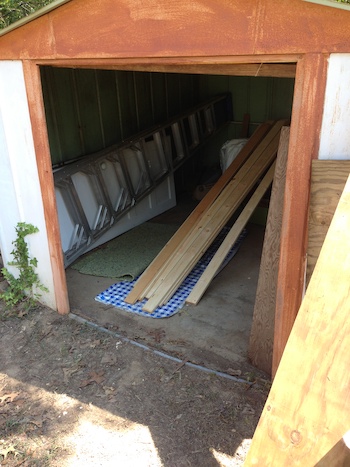
A storm in my brain
One day, I got a nudge from “mischievous me”. I could remake the front of the shed, reinforce the frame and doors, and paint them. Looking back, it was a last ditch effort on my part to save my dad and keep him from dying. I thought this could save him for all of us, especially my mom. I thought if he could look out the window and see the doors on the shed it would give him hope and more life. So I began work on the shed.
I looked at the wood already on hand. After I determined that I needed more, I made the trip to a nearby lumber yard.
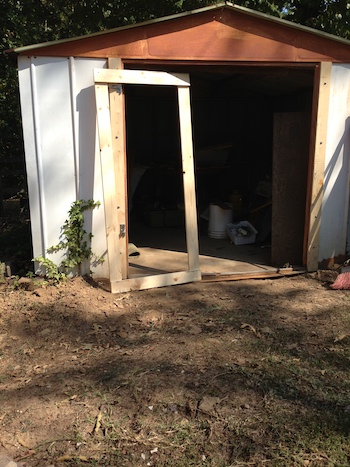
I loaded the lumber in my car and bought a few supplies for the project.
After arriving home, I immediately started making the doors.
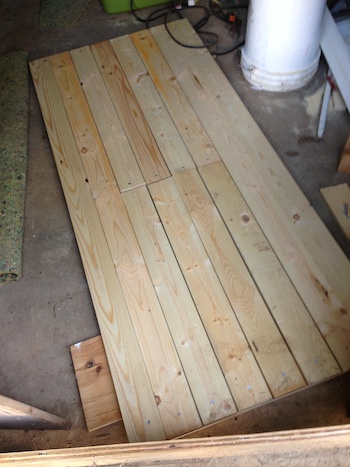
It took two days to finish them. Yes, this was a bootstrap project especially driven by a need to just do something…. anything but accept the inevitable.
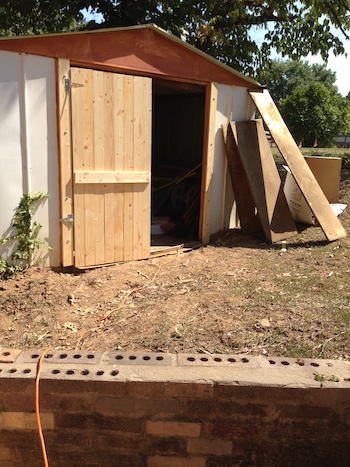
I remember that the sun was shining. The weather was beautiful. All of that gave me comfort as I worked.
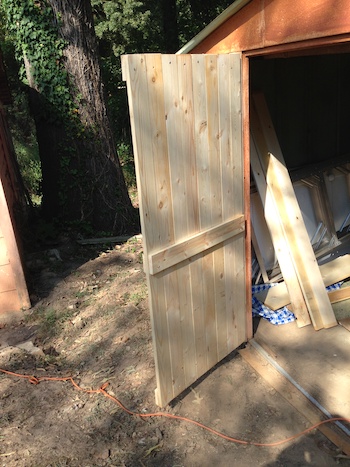
I used all of that lumber. This time I did not have to leave any excess wood in the shed for my dad. I knew that he would not be doing any work with it, even if he somehow recovered.
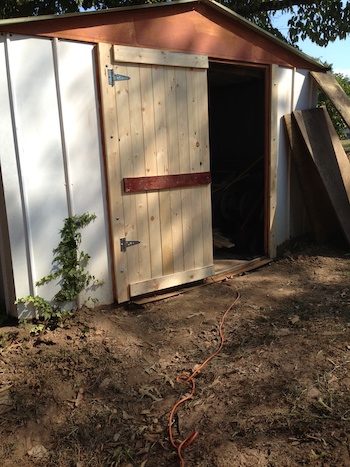
Did it work?
Earlier I wrote: I thought if he could look out the window and see the doors on the shed it would give him hope and more life.
Painfully, it did not work.
No human has that power. I realize that now.
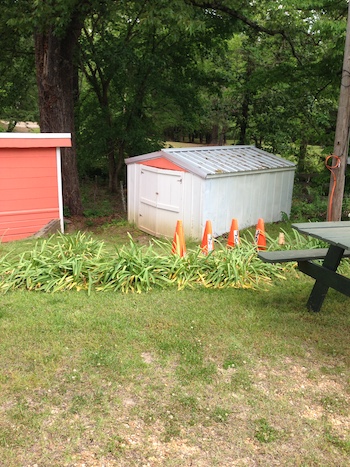
I don’t know if he ever saw the doors, but the project helped me accept that I don’t have the power to save anyone. Importantly, it made me feel less guilty that I could not. Perhaps my dad felt the love and tears that I poured into those doors.
It was my ikigai.
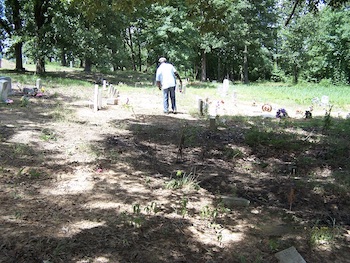
•
When the survivors are gone we must not let the truth disappear with them.
•
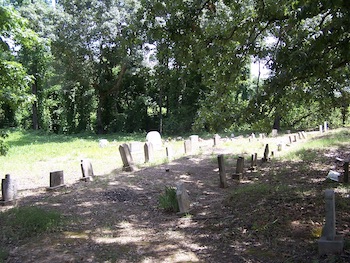
That’s what it was about all along.
Baadaye
Shirley J ♥️

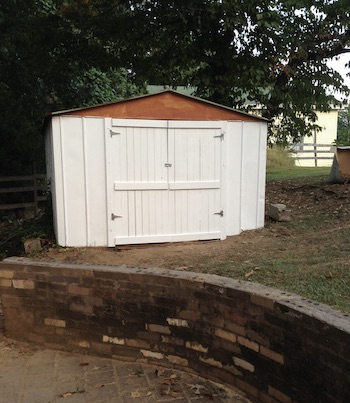
2 thoughts on “● A Shed of Hope”
Yep that’s what he told me, he come back home to do just what he did.
Yup, you know it! Thanks for remembering.